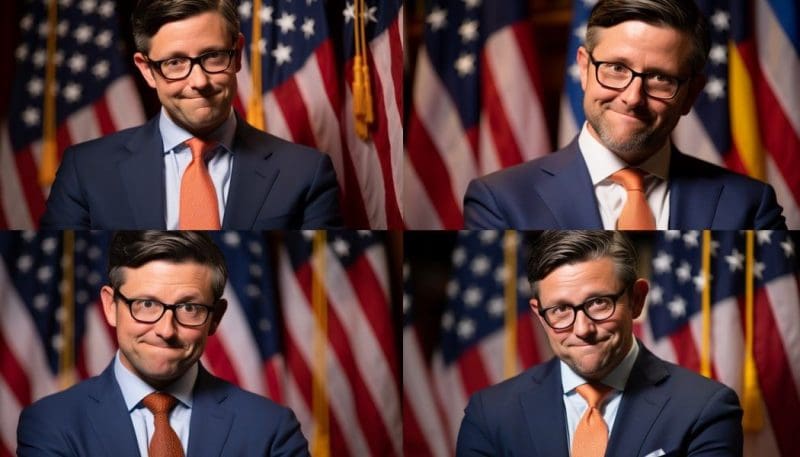
House Speaker Mike Johnson is set to join Donald Trump in an ass-kissing event that underscores ongoing tensions within American democracy.
This putrid gathering, scheduled at Trump’s Florida resort, Mar-a-Lago, highlights the continuing influence of Trump in the Republican Party and signals potential shifts in Johnson’s political standing amid challenges from within his own party.
A Crucial Meeting at “Mar-a-Lardo”
The decision of House Speaker Mike Johnson to stand with Donald Trump is more than a symbolic gesture. It represents a pivotal moment, with Johnson, the highest-ranking elected Republican, navigating a delicate balance. Facing pressure from members of his party who are aligned with Trump, Johnson’s journey to Mar-a-Lago is a clear move towards securing his position. This comes at a time when Trump’s supporters are questioning Johnson’s leadership and suggesting the possibility of replacing him.
The backdrop of this meeting is particularly noteworthy. Trump is on the cusp of a historic moment as the first former president to face trial, with jury selection starting soon in New York related to a payment to an adult film star. Additionally, a legal challenge related to Trump’s possession of classified documents is unfolding, with significant implications for the timing of the case’s resolution.
The Stakes of “Election Integrity”
The announced focus of the joint statement by Johnson and Trump on “election integrity” taps into a deeply controversial issue. This term has become a euphemism for a series of unfounded claims and conspiracy theories about the 2020 election, now forming the basis of Trump’s 2024 presidential bid. Johnson’s willingness to engage with this narrative suggests a strategic move to align with Trump, potentially to safeguard his leadership role.
The conversation is expected to center on allegations about non-citizen voting and state-level proposals that Trump and his supporters have criticized. Despite clear legal restrictions against non-citizen voting in federal elections and the lack of evidence supporting claims of widespread fraud, these issues remain contentious. The focus on non-citizen voting rights in some local elections is poised to fuel further debate, despite a nationwide audit in Georgia finding no successful attempts by non-citizens to register to vote.
The Broader Implications
By aligning with Trump’s campaign on “election integrity,” Johnson is stepping into a vortex of GOP politics where the stolen election myth has gained alarming traction. This stance not only reflects the internal dynamics of the Republican Party but also underscores the broader challenges facing American democracy. As Trump continues to wield significant influence, his narratives around election fraud and non-citizen voting are reshaping political discourse, with potential ramifications for voter laws and the integrity of the electoral process.
Johnson’s support for these claims, alongside his efforts to navigate Trump’s political landscape, highlights the complex interplay of leadership, loyalty, and principle within the GOP. As this situation unfolds, the implications for Johnson’s career, the Republican Party, and the 2024 election cycle are profound, marking a critical juncture in the ongoing debate over democracy and election integrity in the United States.
The Ukraine Aid Controversy: Aligning with Trump’s Stance
An additional layer of complexity in this political saga involves Johnson’s handling of aid to Ukraine, a topic that intersects with Trump’s broader foreign policy views, particularly towards Russia. Reports indicate that Johnson is navigating the contentious issue of a significant aid package intended for Ukraine, amidst pressures that resonate with Trump’s sympathetic stance towards Putin. This alignment is not merely about foreign policy but reflects the broader dynamics of loyalty and influence within the GOP. Trump’s admiration for Putin’s leadership style and his skepticism towards Ukraine aid have been well-documented, positioning Johnson’s maneuvering on this issue as another facet of his efforts to align with Trump. By potentially holding up assistance to Ukraine, Johnson appears to be calibrating his actions to align with Trump’s preferences, further illustrating the deep impact of Trump’s perspectives on GOP policy decisions and the broader discourse around international relations and support for democracy abroad. This stance on Ukraine not only showcases the intricate dance of political alignment within the Republican Party but also signals the broader implications of Trump’s influence on the party’s approach to global politics and alliances.
